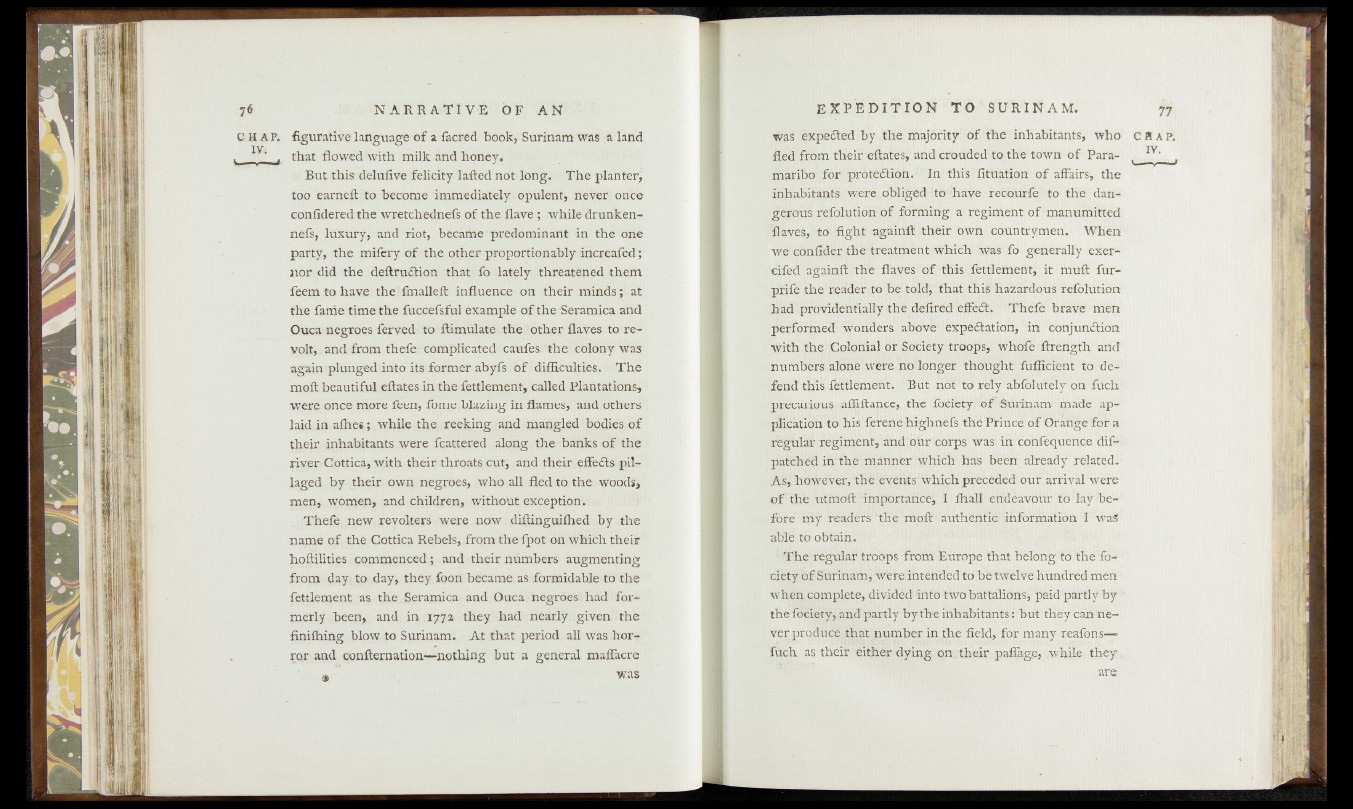
76
C HAP. figurative language of a facred book, Surinam was land
L 1V’ ( that flowed with milk and honey. •
■ But this delufive felicity lafted not long. The planter,
too earned:: to become immediately Opulent, never:once
confidered the wretchednefs of the flave; whiledrunkenr
nefs, luxury, and riot, became predominant in the one
party, the mflery of the other proportion ably iiicreafed;
nor did the deftrudtion that;, fo lately threatened them
feemto have the:finafleft influence,on their minds; at
the fame time the fuccefsfal example of the Seramica.and
Ouga negroes ferved to ftimulate the other flaves to revolt,
and from thefe-complicated caufes; the cblony was
again plunged into its former abyfkPf/ difficulties. r ; The
moft beautiful eftates in the fettlement, called Plantations^
were once more feen, fome .blazing in flames^ and others
laid in alhe«; while the,reeking and mangled bodi%of
pieir inhabitants were fcatitered. along the banks of the
river Cottica, with their throats cut; and theircteffe£ts pillaged
by their own negroes, who all fled to. the woods*
men, women, and children, without exception* /
_; Thefe new revolters were, now diftinguifhed . by the
name of the Cottica Rebels, from the fpot on which their
hoftilities commenced; and their numbers augmenting
from day: to day, they foon became as formidable, to the
fettlement as the Seramica and Guca negroes, had i for*
ijaerly been, and in .177a they had nearly .given, the
finifhing blow to Surinam. At that period all was hor-*
rqr and oonfternation~-np thing but a general maflacre
was
was expe&ed by the majority of the inhabitants, who CJIAP.
fled from their eftates;’ and crouded to the town of Para- , ^ ,
inaribo .forproteition. In this fituation of affairs, the
inhabitants were obliged‘to ‘have recourfe' to the dangerous
refolution.of forming af» regiment of manumitted
flaves, to fight againft their oWn countrymen. When
wO cbpftder the treatment which was fo generally exer-
ci-fed againft the ftavbs’of this fettlement, it muft fur-
prife the reader to be told, that this hazardous refolution
had providentially the deftred effetft. Thefe brave men
performed wonders;-above expectation, in conjunction
with the Colonial or Society troops, whofe ftrength and
numbers" ialone Were no longer thought fufficient to defend
this ffitilfement. ‘ But notJto rely abfolutely on fuch
precarious affiftanqej the fodifety'of Surinam1 made' ap-’
plipatibn to his ferenehrghnefs the Prince of Orahgefor a
regular regiment, and" our corps was in confequence dif-
patehetf iff the- manner Which has been already related.:
As, ’hbwever, the events’which preceded our arrival were
of the utmoft importance, I fhall endeavour to lay before
my readers’the moft authentic information I was
ablb to obtain :,v ‘
' The regular troops frofri Europe that bblong fo theffo-*
ciety of Surinatn,- Were intehdedto be t-ffelvehundred men.
whenkcomplete, divided irftb two battalions;- paid partly by ?
the ft^ety/affdfMrtly by the inhabffayisidSUttiley fean-he-'
ver produce,tpat number in the fields for many, reafons—
fuch 4s: their either dying on-, their paffage, while they*
are